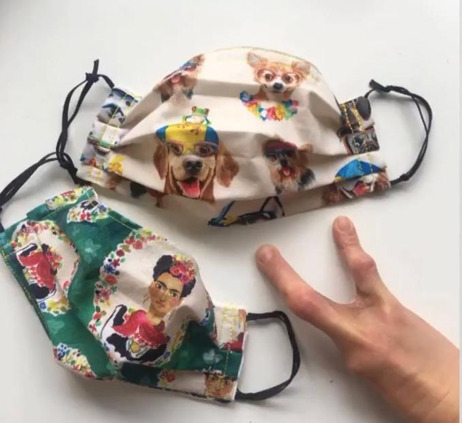Masks for Crips was a mutual aid project that centered the Chicago disability community. Alison Kopit and Chun-shan (Sandie) Yi began the project at the onset of the COVID-19 pandemic, and it ran from March 2020 through July 2020. Early in the pandemic, when personal protective equipment (PPE) was difficult to come by and the state was not caring for those most impacted by the pandemic—disabled people, essential workers, people living in congregate facilities, and unhoused people, to name a few—the project provided homemade masks to disabled people and their care teams in the Chicagoland area. Masks for Crips addressed an infrastructural gap and disability community need in an urgent way, and provided information about how to use and care for masks, as well as best practices for reducing risk surrounding COVID-19. The project was born through text message-based conversation in March 2020 as Alison and Sandie held space for each other by sending memes, texts, and support informally. From those moments of connection, they proceeded to expand outward and develop a mutual aid project that delivered about 300 masks, start to finish. The project brought together delivery and mask-making volunteers while serving as a means of connection and an expression of disabled care during an isolating time.
Articles by Chun-shan (Sandie) Yi
Chun-shan (Sandie) Yi is an assistant professor in the department of art therapy and counseling and the program director of Disability Culture Activism Lab (DCAL) at the School of the Art Institute of Chicago (SAIC). She has a Ph.D. in Disability Studies from the University of Illinois at Chicago; an MA in art therapy from SAIC, and MFA from the University of California Berkeley. She is a disabled artist and disability culture worker whose work focuses on wearable art made for and with self-identified disabled people. As a part of the Disability Art Movement, Yi’s art, Crip Couture explores the issue of intimacy, desire, and sexuality of the disabled bodymind. The latest rendition of Crip Couture researches and archives disability narratives by collecting bodily artifacts, including skin flakes and hair. Crip Couture aims to preserve and conserve disability culture and narratives as heritage. Her research interests include Disability Arts and Culture; disability fashion; accessibility design and programming for arts and cultural venues; and disability culture-informed art therapy.
